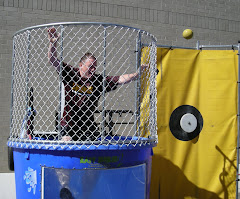August 27, 2010 by David Reber
Topeka K-12 Examiner
I’m going to step out of my usual third-person writing voice for a
moment. As a parent I received a letter last week from the Kansas State
Board of Education, informing me that my children’s school district had
been placed on “improvement” status for failing to meet “adequate yearly
progress” under the No Child Left Behind law.
I thought it ironic that our schools were judged inadequate by people who haven’t set foot in them, so I wrote a letter
to my local newspaper. Predictably, my letter elicited a deluge of
comments in the paper’s online forum. Many remarks came from armchair
educators and anti-teacher, anti-public school evangelists quick to
discredit anything I had to say under the rationale of “he’s a teacher.”
What could a teacher possibly know about education?
Countless arguments used to denigrate public school teachers begin
with the phrase “in what other profession….” and conclude with
practically anything the anti-teacher pundits find offensive about
public education. Due process and collective bargaining are favorite
targets, as are the erroneous but tightly held beliefs that teachers are
under-worked, over-paid (earning million-dollar pensions), and not accountable for anything.
In what other profession, indeed.
In what other profession are the licensed professionals considered
the LEAST knowledgeable about the job? You seldom if ever hear “that guy
couldn’t possibly know a thing about law enforcement – he’s a police
officer”, or “she can’t be trusted talking about fire safety – she’s a
firefighter.”
In what other profession is experience viewed as a liability rather
than an asset? You won’t find a contractor advertising “choose me – I’ve
never done this before”, and your doctor won’t recommend a surgeon on
the basis of her “having very little experience with the procedure”.
In what other profession is the desire for competitive salary viewed
as proof of callous indifference towards the job? You won’t hear many
say “that lawyer charges a lot of money, she obviously doesn’t care
about her clients”, or “that coach earns millions – clearly he doesn’t
care about the team.”
But look around. You’ll find droves of armchair educators who
summarily dismiss any statement about education when it comes from a
teacher. Likewise, it’s easy to find politicians, pundits, and
profiteers who refer to our veteran teachers as ineffective, overpriced “dead wood”. Only the rookies could possibly be any good, or worth the food-stamp-eligible starting salaries we pay them.
And if teachers dare ask for a raise, this is taken by many as clear
evidence that teachers don’t give a porcupine’s posterior about kids.
In fact, some say if teachers really cared about their students they
would insist on earning LESS money.
If that entire attitude weren’t bad enough, what other profession is
legally held to PERFECTION by 2014? Are police required to eliminate
all crime? Are firefighters required to eliminate all fires? Are doctors
required to cure all patients? Are lawyers required to win all cases?
Are coaches required to win all games? Of course they aren’t.
For no other profession do so many outsiders refuse to accept the
realities of an imperfect world. Crime happens. Fire happens. Illness
happens. As for lawyers and coaches, where there’s a winner there must
also be a loser. People accept all these realities, until they apply it to
public education.
If a poverty-stricken, drug-addled meth-cooker burns down his house,
suffers third degree burns, and then goes to jail; we don’t blame the
police, fire department, doctors, and defense attorneys for his
predicament. But if that kid doesn’t graduate high school, it’s clearly
the teacher’s fault.
And if someone – anyone - tries to tell you otherwise; don’t listen. He must be a teacher.
Thanks Cindy and Laura for sharing this with me.




















1 comment:
AMEN! I was a teacher. More precisely, I'm a failed teacher--one of those 20% or so of teachers who quit the profession in the first year.
It makes me cringe when I hear politicians talk about the need to "get all the bad teachers" out of the classroom. Because who they're talking about (without realizing it) is often first year teacher struggling to survive...and teaching has it's own way of weeding those out those who aren't good at what they do, because not succeeding in the classroom means making a horrible work environment for yourself, not just a bad environment for your students. Not that there aren't "bad teachers" out there still, but that's not the main problem with schools. And I think there are more teachers who could teach better if they had less work-load. I don't think most people realize exactly how much work teachers do.
But unfortunately it's not just "arm-chair educators" and politicians that expect perfection from teachers...its other teachers. Between student teaching, subbing, and my brief time as a full-time teacher I got a good taste of how much criticism of other teachers was passed around. I've heard teachers be harsher with other teachers (at least behind their backs--don't know what they said to their faces) than any outsider. I've gotten a taste of that myself on teacher forums online. In the midsts of student teaching I had a really successful lesson, and even though I was tired stayed up to post my lesson plan online for others to use. It was late, I was tired, and didn't double check it so it was full of typos (as this post may also be). The next day, it wasn't that people corrected them that bothered me. It was the multiple comments like "You shouldn't be a teacher if you can't even spell" that brought me to tears. I would understand that if this was a published work...but, that much venom over typos on a forum post? I do think teachers need more support...but I think we need to be more supportive of each other too. That doesn't mean not criticising, but it means not criticising in a way that tears each other down. Because right now politicians idea that schools are full of "bad teachers" that need to be weeded out wouldn't be changed if they overheard the conversations in a typical teacher's lounge.
Post a Comment